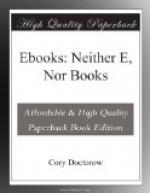And finally, of course, there’s the matter of selling books. However an author earns her living from her words, printed or encoded, she has as her first and hardest task to find her audience. There are more competitors for our attention than we can possibly reconcile, prioritize or make sense of. Getting a book under the right person’s nose, with the right pitch, is the hardest and most important task any writer faces.
#
I care about books, a lot. I started working in libraries and bookstores at the age of 12 and kept at it for a decade, until I was lured away by the siren song of the tech world. I knew I wanted to be a writer at the age of 12, and now, 20 years later, I have three novels, a short story collection and a nonfiction book out, two more novels under contract, and another book in the works. [BOOK COVERS] I’ve won a major award in my genre, science fiction, [CAMPBELL AWARD] and I’m nominated for another one, the 2003 Nebula Award for best novelette. [NEBULA]
I own a lot of books. Easily more than 10,000 of them, in storage on both coasts of the North American continent [LIBRARY LADDER]. I have to own them, since they’re the tools of my trade: the reference works I refer to as a novelist and writer today. Most of the literature I dig is very short-lived, it disappears from the shelf after just a few months, usually for good. Science fiction is inherently ephemeral. [ACE DOUBLES]
Now, as much as I love books, I love computers, too. Computers are fundamentally different from modern books in the same way that printed books are different from monastic Bibles: they are malleable. Time was, a “book” was something produced by many months’ labor by a scribe, usually a monk, on some kind of durable and sexy substrate like foetal lambskin. [ILLUMINATED BIBLE] Gutenberg’s xerox machine changed all that, changed a book into something that could be simply run off a press in a few minutes’ time, on substrate more suitable to ass-wiping than exaltation in a place of honor in the cathedral. The Gutenberg press meant that rather than owning one or two books, a member of the ruling class could amass a library, and that rather than picking only a few subjects from enshrinement in print, a huge variety of subjects could be addressed on paper and handed from person to person. [KAPITAL/TIJUANA BIBLE]
Most new ideas start with a precious few certainties and a lot of speculation. I’ve been doing a bunch of digging for certainties and a lot of speculating lately, and the purpose of this talk is to lay out both categories of ideas.
This all starts with my first novel, Down and Out in the Magic Kingdom [COVER], which came out on January 9, 2003. At that time, there was a lot of talk in my professional circles about, on the one hand, the dismal failure of ebooks, and, on the other, the new and scary practice of ebook “piracy.” [alt.binaries.e-books screengrab] It was strikingly weird that no one seemed to notice that the idea of ebooks as a “failure” was at strong odds with the notion that electronic book “piracy” was worth worrying about: I mean, if ebooks are a failure, then who gives a rats if intarweb dweebs are trading them on Usenet?




